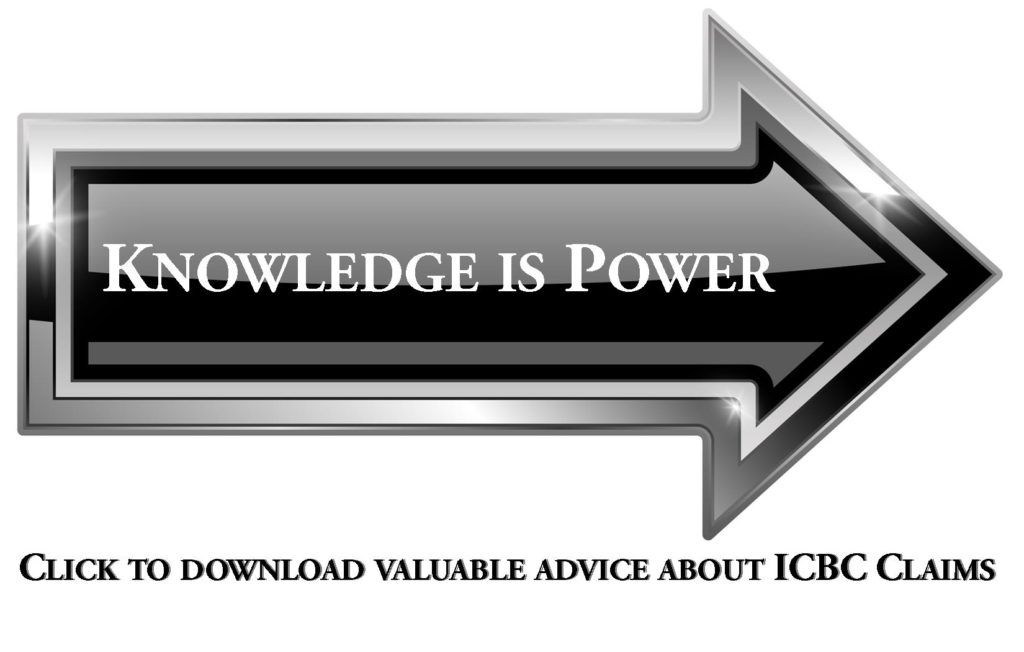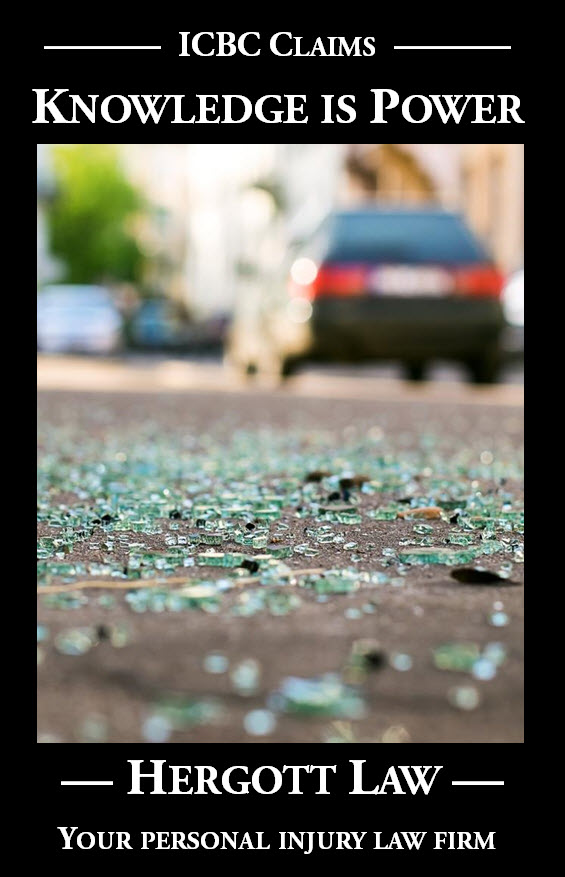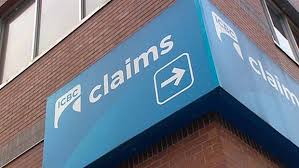Hergott Law is undergoing a dramatic transition in the services we provide.
Dramatic changes in British Columbia law, stripping away the rights of innocent victims of car crashes, has led to no longer pursuing fair compensation for innocent victims of all personal injury matters, but Paul Hergott will consult on a limited basis, providing referrals to other lawyers continuing to do that work.
We will be embarking in a new area of law and providing services in Estate Management and Administration.
Reclaiming Life from Chronic Pain – click here to download our program guide
ICBC Claim Advice
It is important that you learn about your legal rights, and how to protect your claim, as soon as possible after an injury occurs, whether or not you have any intention of hiring a lawyer. Understanding how a personal injury claim works and having the benefit of important advice and guidance will equip you to ensure you take steps that are important to maximize the likelihood of a fair result and to ensure that you avoid taking missteps that could jeopardize your claim. There are also technicalities such as “limitation periods” that ICBC will use to try to deny your claim if given the chance, which you need to learn about.
- The size of your claim
- Does it make sense to hire a lawyer?
- What injury is ‘most minor’ and why might a lawyer not be required
- Hiring a lawyer
- Important Advice
The size of your claim
 The size of your claim will depend on how long, and to what extent, you suffer losses arising from the injuries you sustained. Claim value has nothing to do with the crash itself, how much damage there was to the vehicles, or how ridiculously careless the offending driver happened to have been. If injuries resolve completely within a short period of time, then the losses will be relatively small, and therefore the amount of compensation required to compensate for those losses, will be relatively small. If injuries do not resolve completely, perhaps leaving you with some degree of permanent symptoms, then the losses will be relatively large, and the cost to the insurance company to fairly compensate for those losses will be relatively large.
The size of your claim will depend on how long, and to what extent, you suffer losses arising from the injuries you sustained. Claim value has nothing to do with the crash itself, how much damage there was to the vehicles, or how ridiculously careless the offending driver happened to have been. If injuries resolve completely within a short period of time, then the losses will be relatively small, and therefore the amount of compensation required to compensate for those losses, will be relatively small. If injuries do not resolve completely, perhaps leaving you with some degree of permanent symptoms, then the losses will be relatively large, and the cost to the insurance company to fairly compensate for those losses will be relatively large.
Does it make sense to hire a lawyer?
Generally speaking, it makes sense to hire a lawyer in all but the most minor of injury claims. One of my first newspaper columns, published January 28, 2007, dealt specifically with the importance of hiring a lawyer to assist with a personal injury claim and I invite you to read it following this hyperlink: It’s worth hiring a lawyer. A more recent column, published May 1, 2011, reinforces that advice by explaining about how auto insurance works: Many drivers are misinformed about their auto insurance.
What injury is ‘most minor’ and why might a lawyer not be required?
 The level of injury that I refer to as “most minor” is one resulting in symptoms that resolve 100% completely within several months of the crash. Typically, fair “pain and suffering” compensation for such an injury is less than $10,000.00. In addition to “pain and suffering” compensation, there will be additional compensation required to reimburse for lost income and expenses incurred for medical treatment and other crash related expenses.
The level of injury that I refer to as “most minor” is one resulting in symptoms that resolve 100% completely within several months of the crash. Typically, fair “pain and suffering” compensation for such an injury is less than $10,000.00. In addition to “pain and suffering” compensation, there will be additional compensation required to reimburse for lost income and expenses incurred for medical treatment and other crash related expenses.
An insurance company will typically offer very close to fair compensation for these “most minor” of injury claims. As an example, ICBC has been known to offer $3,000.00 or $5,000.00 compensation as early as within days after a crash. If fair compensation is offered, you will just be throwing money away by paying one-third of your claim to a lawyer.
The thing is, you risk being taken advantage of (to the extreme) if you settle soon after a crash, before you know with certainty whether or not your symptoms will 100% resolve within that short period of time and fall into that “most minor” category. Only time can tell whether or not that will be the case. I ask that you please wait out that time. Often, doctors and therapists are very optimistic about a full recovery. Often, that optimism is well placed. Sometimes, though, it is not. All too often, injured victims settle their claims for unfairly low compensation on the optimistic prediction of medical people or an insurance adjuster that injuries will resolve over time. I invite you to read the blog posting of my January 21, 2007, column, Want a quick settlement to your injury claim? Think again.
In the wonderful event that your symptoms do 100% completely resolve within a few months of a crash, please run a proposed ICBC settlement by a personal injury lawyer on free, no obligation basis, simply to ensure you are doing the right thing.
Hiring a lawyer
 If your injuries are not in the “most minor” category, such that it makes sense to hire a lawyer, there comes the important decision of which personal injury lawyer to retain.
If your injuries are not in the “most minor” category, such that it makes sense to hire a lawyer, there comes the important decision of which personal injury lawyer to retain.
Fair results can be obtained by any competent personal injury lawyer. I encourage you to take the choice of personal injury lawyer very seriously and do whatever you feel is necessary to make the right choice, including talking to members of the medical community (doctors/therapists/specialists), talking to friends/family/co-workers, and interviewing a number of lawyers to ensure you find the best fit.
I am thankful that I have developed a reputation such that I do not need to “chase” files. My “paid” advertising budget is extremely low. In fact, I am having to turn many cases away. When I agree to take on a case, I want to ensure that my client has made an informed decision to work with me, and has complete confidence that I have “the stuff” to carry through with my commitment to achieve justice.
Important Advice
 In the meantime, I quite emphatically offer you the following advice, or “coaching”, to maximize the probability that you will achieve a fair result in your claim:
In the meantime, I quite emphatically offer you the following advice, or “coaching”, to maximize the probability that you will achieve a fair result in your claim:
1. It is important to “aggressively pursue treatment”, by following up regularly with your doctor and following your doctor’s, chiropractor’s, physiotherapist’s, etc. recommendations 100% fully. Don’t make any treatment decisions without first clearing them with your medical team and CERTAINLY don’t let ICBC make any treatment decisions for you by, for example, cutting off funding for treatment. I invite you to read my May 30, 2010, column on this key point: Important to continue with treatment.
2. If you cannot afford to pay for medically recommended treatment on your own, I strongly recommend that you do whatever you have to in order to come up with financing. Sometimes, this means borrowing money. If so, I recommend that your find the absolute lowest cost financing which is often from friends or extended family. Rather than paying a bank perhaps 5% interest on a line of credit, a credit card company several times that, or a “litigation lender” that you could find on the internet 30-40% interest, you can pay a family member something like 3% interest, more than you would pay to a bank on a line of credit and more than your family member would earn on a secure investment, and everybody wins. Any lawyer you hire can prepare the paperwork to document and secure the loans, and you can claim reimbursement for that interest from ICBC.
3. Please “preserve the evidence” by keeping a journal or diary. The diary needn’t record dates and times of doctor, massage, physiotherapy, etc. visits, which will all be recorded by your doctor and therapists. The diary is for practical day to day impacts of injury, such as how the injury stops you from doing such and such or how doing this and that brought on muscle spasms, how it FEELS to be injured, etc., etc. You may wish to read my May 6, 2007, column on this important topic: Don’t let evidence fade: Document it.
4. As decisions have to be made about what work duties to avoid, how many hours a day to work, whether or not you should leave work for a period of time, etc., follow your doctor’s recommendations, whatever they may be, keeping your doctor updated as to how things are going because the impact of working on your symptoms will influence the doctor’s recommendations. I invite you to read this June 24, 2007, column explaining my advice in this regard: Ground rules for returning to work.
5. You should take the same approach when returning to your non-work activities. My July 1, 2007, column specifically on that topic is as follows: Talk to your doctor about returning to your activities.
6. If you are self-employed, and your income losses cannot easily be calculated by multiplying hours missed by an hourly rate, there comes the “interesting” project of calculating and proving the loss of self-employment income arising from your injuries. Some (likely significant) brainstorming needs to be done to determine to what extent you have lost income since the crash and also to consider potential future losses, and how to prove any of these losses when that time comes. I invite you to review two columns that I’ve written about proving income loss as well as the issue of “mitigation”:
a) One, published August 29, 2010: If you can’t prove what earnings would be you’re outta luck
b) The other, published September 5, 2010: Pretend you won’t be compensated to mitigate your losses
Please be clear that there are limitation periods within which a lawsuit to enforce a claim arising from a car crash injury must be commenced, failing which your rights arising from that crash might forever be lost. There are also technical requirements in certain circumstances that, if not followed, could result in complete loss of your claim. I encourage you strongly to consult with a lawyer immediately to determine what limitation period applies to your case (likely two years, but could be much shorter) and to determine if there are any technical requirements to be concerned about.



